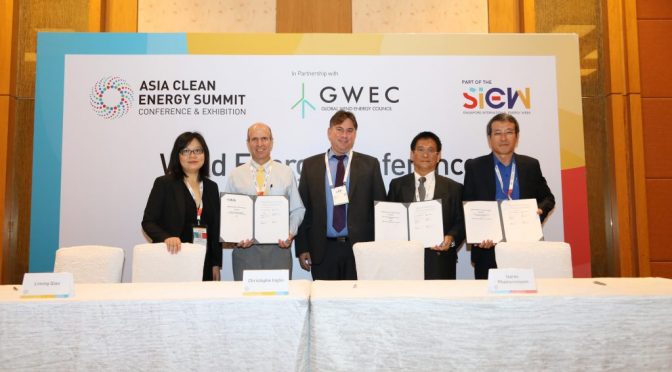GWEC signs three MOUs with Sustainable Energy Association of Singapore (SEAS), Binh Thuan Wind Energy Association (BWEA) and Thai Wind Energy Association (ThaiWEA) to accelerate the growth of wind energy in South East Asia, with a focus on Vietnam and Thailand
Partnerships to strengthen the deployment of wind energy by engaging all relevant stakeholders in a key region for economic growth, where the energy generation mix remains reliant on fossil fuels despite tremendous renewable energy potential
According to GWEC Market Intelligence, Vietnam and Thailand are well positioned to lead the energy transition in South East Asia, with 1GW and 800MW of onshore wind power expected to be installed over the next 5 years, respectively, if challenges such as PPA bankability, permitting and local capacity for financing are overcome.
The Global Wind Energy Council (GWEC) has signed a series of three MOUs with regional partners in Singapore, in order to support and accelerate the growth of wind energy in South East Asia, with a focus on Vietnam and Thailand. The agreements were signed with: Sustainable Energy Association of Singapore (SEAS); Binh Thuan Wind Energy Association (BWEA); and Thai Wind Energy Association (ThaiWEA).
Vietnam and Thailand are positioned to become leaders in the region’s energy transition, with enormous wind power potential. Vietnam is expected to install more than 1GW of onshore wind power capacity over the next five years, and has a promising offshore wind sector, according to GWEC Market Intelligence. Thailand with 1500MW projects in pipeline of onshore wind is championing the South East Asia market. While these markets have strong fundamentals for renewable energy, they still face challenges such as permitting, bankability of PPAs and local capacity for financing.
Liming Qiao, Asia Director of GWEC, said: “South East Asia will become a key growth region for renewable energy. Steady GDP growth, urbanisation and rising populations have fuelled the region’s electricity demand, which has increased by an average 6.1 per cent annually since 2000. However, fossil fuels, and particularly coal-fired generation, continue to dominate the energy generation mix, with adverse socioeconomic and health impacts. It is imperative that stakeholders across South East Asia – from governments to investors to communities – work together to advance the deployment of clean energy. We are confident that through the new cooperation with our regional partners, we can overcome challenges such as system integration and market design, in order to promote the role of wind energy in South East Asia’s sustainable development.”
Kavita Gandhi, Executive Director of SEAS, said: “Established 13 years ago, SEAS is committed towards fostering growth in the sustainable energy ecosystem across Singapore and Asia Pacific. Through our partnership with GWEC, we hope to expand our cooperation on wind power capacity building within the South East Asia region.”
Bui Van Thinh, Chairman of BWEA, said: “BWEA has been working closely with GWEC in the past two years attempting to set up a Vietnam National Wind Energy Association. With Vietnam wind development storming ahead of the ASEAN pack, the time is no better than now, to have an industry association to represent the wind industry in Vietnam. We look forward to a more comprehensive collaboration with GWEC and other regional associations to build a robust regional partnership.”
Isares Phamornniyom, Chairman of ThaiWEA, said: “While Thailand has been intensifying the role of wind power in the past few years, the industry is facing great difficulty going forward without ambitious wind target and clear permitting process. ThaiWEA is aware of this challenge and is mitigating it with our policy work that pushes for a long-term target of wind energy in the revision of the Power Development Plan 2018. We look forward to further partnerships that would support the development of wind power in this region.”
The MOUs signed today:
Recognise the mutual interests of each organisation in upscaling wind energy and promoting its role in sustainable development;
Facilitate cooperation in the field of wind energy development, with a view to establishing positive policy environments and an acceleration pathway for wind power in the region, and particularly Vietnam and Thailand;
Support the development of technical activities, joint publications and other initiatives.The MOUs were signed on the occasion of the Wind Energy Conference at the Asia Clean Energy Summit during Singapore International Energy Week, marking wind energy as one of the key transition technologies for the region. Roland Roesch, Deputy Director Innovation and Technology Center, International Renewable Energy Agency (IRENA), served as a witness to the signing.


